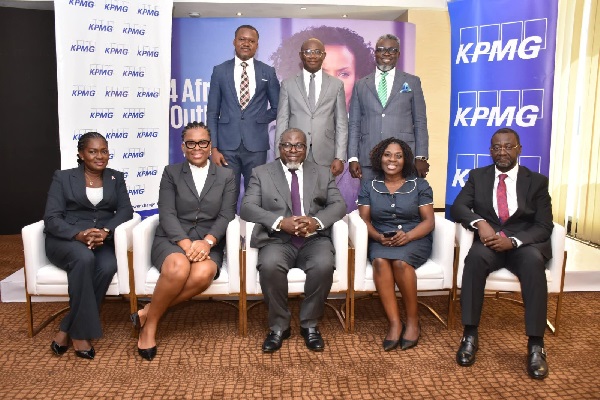
Stay clear of political entanglements — Businesses advised
Business leaders must build politically-neutral enterprises that can withstand government changes and shifting political winds, Economic Lecturer at the University of Ghana, Dr Priscila Twumasi Baffuor has advised.
She cautioned businesses against the over-involvement in politically sensitive activities and value chains that could make companies vulnerable to policy shifts when administrations change.
The economist emphasized that sustainable business growth should be anchored on solid macroeconomic fundamentals rather than political alignments, noting that current indicators point to promising recovery trends for enterprises that maintain political independence.
Dr Twumasi Baffuor said this in an interview with the media on the sidelines of the launch of the 2024 KPMG Africa CEOs Outlook Survey in Accra.
“Businesses must build resilience and not be too susceptible to political interferences. I believe they need not to be too involved in politically sensitive activities and politically sensitive value chains.
“Because if indeed you are and there happens to be a change which doesn't favour the business then it means that the business doesn't thrive and so essentially we are looking for businesses that are resilient regardless of which government is in power,’ she stated.
Economic recovery
She said there were signs of good recovery on the economic front and if all things are equal and businesses plan based on the trajectory, then the future recovery would go well.
The Economist, however, highlighted that geopolitical risks were imminent, adding that “it is here, no country is an island, whatever happens elsewhere affects us particularly for an economy like Ghana which is highly import dependent.”
“We see a lot of our companies are intertwined and so for example we know the effect of Russia/Ukraine conflict, COVID-19 on cost of fuel, and cost of food,” she mentioned.
She also cited tensions Middle East and its tendency to escalate cost of fuel that could lead to increasing cost of living.
“So for me, we need to get back to basics and build on the very basic fundamentals so that to a large extent, we reduce our import dependence and when that happens no matter how political tensions rise you feel that you are insulated somehow in your local economy.
“But as it stands now, we are heavily dependent on external sources and that means that a lot of the indicators are out of balance,” she added.
Key findings of survey
The survey indicated that CEOs identify technology and generative AI, talent, ESG, and geopolitics, as the top four risks facing their organization’s growth prospects.
It also indicated that ethically implementing emerging technologies was a paramount priority for CEOs across Africa.
Over 77 per cent of African CEOs highlighted ethical dilemmas as a big challenge within their enterprises.
CEOs across Africa also agreed that key investment priorities include governance models and transparency protocols, addressing environmental challenges, with a focus on diversity, equity, and inclusion.
The Senior Country Partner of KPMG, Anthony Sarpong, said the CEO Outlook gathered the views of over 130 CEOs across the globe.
He said it was to have a sense of what CEOs actually think about looking forward.
This year’s survey focused on four thematic areas; economic outlook; AI as an evolving technology; ESG; and particularly about people and talent.
“If you look at people, clearly what is showing in Africa, we do have younger generations, but it's so important that although we have the younger generations, we must scale them and make sure that we prepare them for the future.
“As the current leadership and old generation transition is important that we do spend time to invest in people. Interestingly, globally, some CEOs are investing in AI as opposed to the scaling of people,” Mr Sarpong said.
He said this was, however, a conversation that must be had, adding that “whatever we do, even with the evolving technologies, the human person must be at the center of all.”
“And therefore, as we invest in technologies, we must also upscale people to make sure that the technologies complement the human beings other than the other way around,” he said.